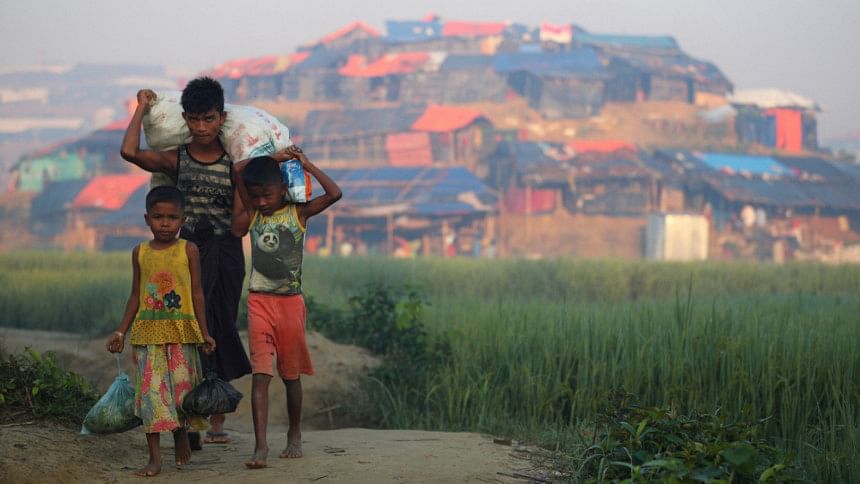No turning point yet

In recent weeks, there have been a flurry of diplomatic activities in the Rohingya camps in Bangladesh, starting with the high-level visit of Myanmar delegation led by Myint Thu, Myanmar's Permanent Secretary to the Ministry of Foreign Affairs, to Cox's Bazar. The repatriation of the Rohingyas was a major topic at the 2019 meeting of the Association of Southeast Asian Nations (Asean) held recently in Bangkok. The United Nations High Commissioner for Refugees also visited Bangladesh and Rakhine state. Prime Minister Sheikh Hasina was in Japan and later in China to press hard the Rohingya repatriation case, where she was assured that Beijing would "do whatever is required" to help resolve the Rohingyas crisis.
So, are we facing a turning point when it comes to the Rohingyas' repatriation?
Myanmar officials held talks with Rohingya leaders, including women from the refugee community in Cox's Bazar, to convince them to return to Myanmar. The Rohingyas fled a brutal military crackdown in 2017 that included mass killings and gang rapes executed with a genocidal intent. Hundreds of Rohingya villages were completely burned down by the Myanmar army, forcing people to flee across the Naf River to Cox's Bazar, which now hosts around 1.2 million Rohingya refugees and is home to the largest refugee camp in the world. These refugees continue to live there as a stateless people. The Rohingyas still fear for their safety if they return to Myanmar, where the Muslim minority population faced decades of oppression and discrimination as they are perceived as outsiders and illegal immigrants. In addition, the Myanmar government confined tens of thousands of Rohingyas to camps in the western Rakhine state since violence swept the region in 2012.
It is difficult to assess what the delegates have achieved through the talks in which the Myanmar officials took a strong stance against citizenship for Rohingyas and promised to provide only ID cards to them as "foreigners" in Myanmar. The fundamental demands of the minority group are recognition as ethnic Rohingyas, citizenship, and guarantee of security by the international community. Bangladesh and Myanmar signed a repatriation deal in November 2017, but so far, no Rohingyas have volunteered to return. Another much-publicised repatriation move was stalled in November 2018 when none of the Rohingyas agreed to return.
Myanmar is now facing strong international pressure to allow the Rohingyas to return home to Rakhine with full citizenship rights and security. However, Myanmar is being stubborn and to date the country has failed to demonstrate any real flexibility or moderation in dealing with the crisis and reaching an acceptable solution. The UN and a number of human rights groups have openly come out with statements that Myanmar lacks even minimal preparation for the safe and dignified return of the Rohingya refugees. The UN has also complained that progress in addressing the refugee crisis has been far too slow.
The recently-held 34th Asean Summit in Bangkok has not been very helpful either, as the regional body, in its own internal assessment report, failed to acknowledge the Myanmar military's atrocities and the ongoing human rights abuses against the Rohingyas. In the spirit of an honest broker, Asean should stop turning a blind eye to the actions of its own member country, Myanmar, and support the legitimate repatriation process of the Rohingyas. Unless Myanmar is held accountable for the genocide, crimes against humanity and war crimes that it has committed against the Rohingyas, the situation inside Myanmar will not see any significant change required to build confidence among the refugees to return. If they do, the returnees will remain vulnerable to the same violence that caused them to flee Myanmar in the first place. Repatriation without addressing the root causes will amount to sending the Rohingya refugees back to the same deathtrap that they had narrowly escaped and risks them being re-victimised.
Malaysian PM Mahathir Mohamad in a recent statement called for an end to the genocide against Rohingyas and urged for them to be granted full rights as citizens of Myanmar or provided with territory so that they can form their own state. PM Mahathir's remarks on the Rohingyas angered Myanmar. While Mahathir's proposal for a separate state received mixed reactions from the Rohingya diaspora and lacks clarity, his statement was factual when he said that Myanmar had committed genocide. The international community must not forget the horrors that the Rohingyas face today in their own country.
Meanwhile, two years after the mass influx of the Rohingyas to Bangladesh, no concrete measures have been taken to facilitate their return to Myanmar, although Bangladesh Foreign Minister AK Abdul Momen expects repatriation to begin by September 2019. There is still no guarantee of citizenship for the Rohingyas, which they have been denied since 1982. Indeed, Myanmar has shown no sign of taking seriously a single demand made by the Rohingya refugees as prerequisites for their return—demands which have also been echoed by rights groups and the international community.
A pragmatic approach that can facilitate the return of the Rohingyas to their homeland with dignity and rights requires understanding and empathy. Finding a sustainable "win-win" solution, which can satisfy all parties involved, will be difficult. The challenge lies in striking a balancing act for the resolution of the current impasse over repatriation of the Rohingya refugees. We need to understand what the Rohingya refugees expect and where their priorities lie and find a sustainable solution accordingly.
Mohammad Zaman is an international development/resettlement specialist and advisory professor at the National Research Centre for Resettlement (NRCR), Hohai University, Nanjing, China. Email: [email protected]

 For all latest news, follow The Daily Star's Google News channel.
For all latest news, follow The Daily Star's Google News channel. 



Comments